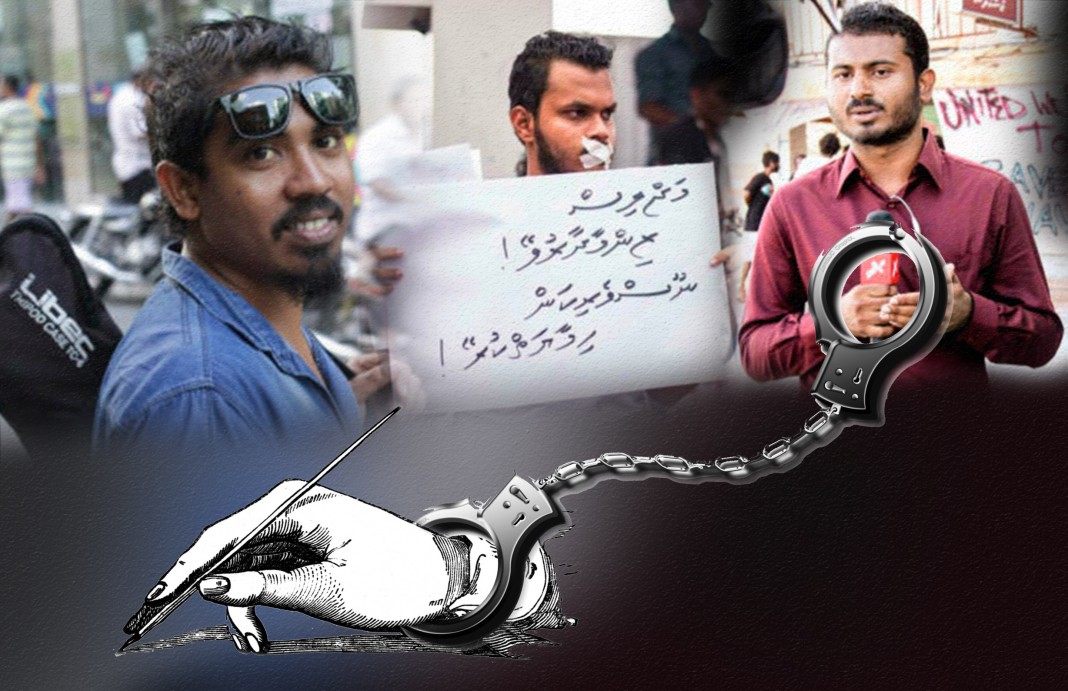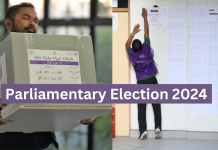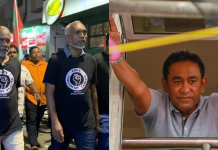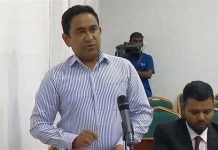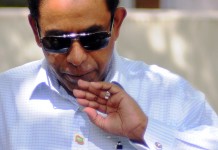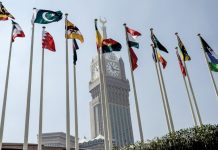For the first time in more than a decade, Maldivian journalists risk jail for critical reporting. Mohamed Wisam, Leevan Ali Naseer and Adam Zareer, are the first Maldivian journalists to be prosecuted under controversial “Defamation Law” since the country adopted a democratic constitution in 2008.
Majority Leader (PPM) Ahmed Nihan has said that jail will teach journalists to stay in line.
Prosecution of journalist under new controversial “Defamation Law” stands in stark contrast to the lack of justice for crimes committed against the press, including the disappearance of Maldives Independent journalist Ahmed Rilwan, the arson attack on Raajje TV, the near-fatal beating of the station’s former news head, Asward Ibrahim Waheed, and the mass death threats sent via text messages to journalists.
Zareer, Leevan and Wisam, share in their own words on why they continue to report idea of “Free Voice” despite the risks they face.
Adam Zareer : “The most important public service one can do”
 I grew up on the island of Rakeedhoo in Vaavu Atoll. In 2014 applied for the post of cameraman at Raajje TV. I was concerned by the government’s control of information. All media outlets were under the government’s control and that of pro-government politicians and businessmen. how the public broadcaster manipulated information .Despite the threats, arrests and now legal action, I have not even considered quitting Raajje TV because this is an important job. If I have to go to jail, I am most concerned about my wife and my daughter, Yoolie. She will turn three in March. How will they take care of themselves? I refuse to leave the Maldives because I believe whatever is to happen will happen for the best. I am not guilty of a crime, I know it and the whole world knows it. Why should I hide ?
I grew up on the island of Rakeedhoo in Vaavu Atoll. In 2014 applied for the post of cameraman at Raajje TV. I was concerned by the government’s control of information. All media outlets were under the government’s control and that of pro-government politicians and businessmen. how the public broadcaster manipulated information .Despite the threats, arrests and now legal action, I have not even considered quitting Raajje TV because this is an important job. If I have to go to jail, I am most concerned about my wife and my daughter, Yoolie. She will turn three in March. How will they take care of themselves? I refuse to leave the Maldives because I believe whatever is to happen will happen for the best. I am not guilty of a crime, I know it and the whole world knows it. Why should I hide ?
Leevan Ali Naseer : “There is no way I can get out in such a corrupt system”
 To be honest, I think I will be sent to jail. There is no way I can get out in such a corrupt system. The charges were never true: I did not attack or obstruct a police officer. But here I am, a convicted criminal. I am from Addu. I moved to Malé after completing fifth grade in Addu. I worked at a photocopy shop and joined Raajje TV in 2015 as a trainee.
To be honest, I think I will be sent to jail. There is no way I can get out in such a corrupt system. The charges were never true: I did not attack or obstruct a police officer. But here I am, a convicted criminal. I am from Addu. I moved to Malé after completing fifth grade in Addu. I worked at a photocopy shop and joined Raajje TV in 2015 as a trainee.
I have never considered quitting: even after the arrest, trial and conviction. If anything, I am more encouraged, because I realise now how important it is that journalists continue doing their work. Journalism is a public service. To aspiring journalists I want to say: Do not hesitate. It takes courage and thick skin, but it is really important that young people enter this profession. I am most thankful for the support of my family and colleagues at Raajje TV. I am also encouraged by public support. Sometimes people stop me on the street and ask me about the trial. Their concern is a huge encouragement.
Mohamed Wisam : “Even if I were to go to jail, I will come back as a journalist”


